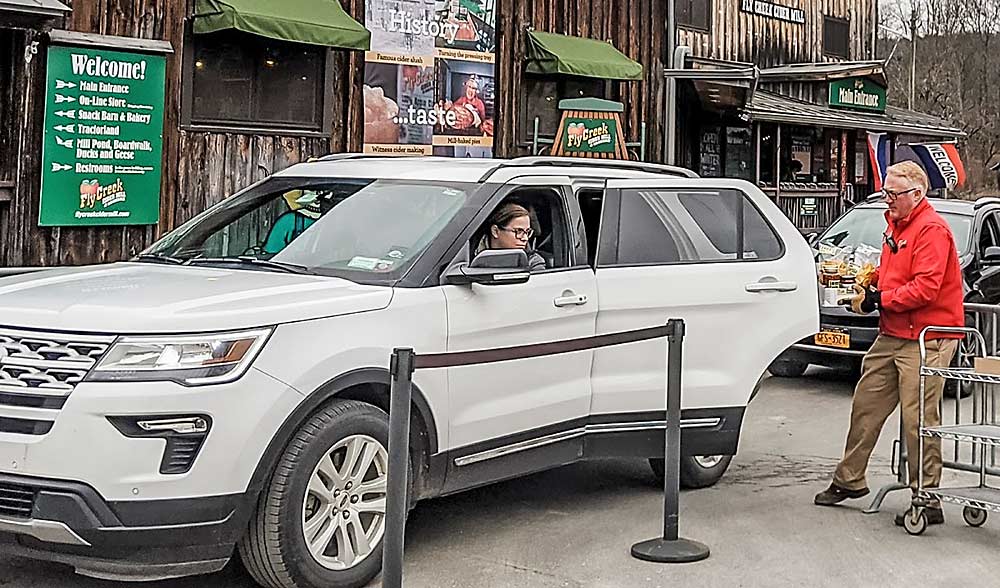
As “essential” providers of food and beverages, most U.S. farm markets got the green light to continue operating while the new coronavirus pandemic shuttered schools and nonessential businesses in March. But operating in the midst of social distancing, and the uncertainty about how long it will last, appears to be anything but business as usual.
In late March, Good Fruit Grower magazine interviewed a handful of farm market owners to learn how they were adapting to the unprecedented situation. All were still selling products in one way or another, though some had closed their physical doors. Sales and staff hours were down for some, but actually up for others. Early spring is a slow time of year for most farm markets, so the financial impacts were not yet significant, but all were looking ahead to summer and especially fall — their most profitable period — with trepidation.
“It’s too early to say how this will impact the fall,” said Lisa Dean, membership and communications manager for the North American Farmers Direct Marketing Association. “(Farm markets are) working toward the season at hand, trying to plan ahead for what that might look like.”
She said NAFDMA members were relying more on drive-up service and curbside pickup, as well as an increase in online ordering.
“They’re getting creative to find ways to adapt,” Dean said. “They want to protect their employees as well as the community, but it’s a fluid situation. Things that might have worked a couple of weeks ago might have to be reinvented.”
She said at least one thing was certain: Markets were putting out more hand-washing stations and hand sanitizer.
Curbside service and online sales
At Holmberg Orchards and Winery in Gales Ferry, Connecticut, owner Amy Holmberg had “jumped right into” curbside pickup and online shopping in response to the pandemic, and sales were up for that time of year. Prior to the pandemic, she had created an online store with the platform Square for pie and fruit basket orders, but she added all of her market’s products after moving to curbside service in March. At that point, the market only needed an hour’s notice to prepare an online order. It worked so well Holmberg anticipated sticking with the Square store method even after things went back to “somewhat normal,” though with a longer lead time, she said.
The market’s customers also could call in orders and pick them up curbside, or order directly from their vehicles. Every product, including prepared foods and baked goods, was being sanitized and packaged ahead of time, Holmberg said.
Online/curbside shopping was more labor-intensive, she said. A dozen workers staffed the market, a typical number for that time of year, but they were working longer hours than normal.

Not every market could keep a full staff, however. Robinette’s Apple Haus & Winery in Grand Rapids, Michigan, had to lay off some workers when it closed its gift shop and winery in late March, said Ed Robinette, president of the family company. Others stayed on as the company switched to selling baked goods, fruit and other products via curbside pickup and delivery.
Sales were down for that time of year, but not terribly so. They’d lost the tour groups and other parties that came to the winery for tastings, but families were still arriving to buy bread, apples and cider, and to spend a little time eating at picnic tables or wandering the orchards, he said.
Meanwhile, Robinette, his two brothers and son were performing the spring orchard tasks, as usual, and making deliveries within 5 miles of the market.
“We’ll muddle through the best we can,” he said. “It’s tough to plan because the situation changes by the day.”
When Pennsylvania closed nonessential businesses in mid-March, Ridgetop Orchards initially decided to shut its farm market early. The market, which handles a small (but growing) percentage of the orchard’s overall sales, usually closes for the season on March 31. When they announced they were closing early, however, they got so much pushback on Facebook that they decided to stay open, said owner Mark Boyer. The customer base is small but loyal, and they wanted to have a place to buy local fruit during an uncertain time, he said.
So, Ridgetop kept its doors open, taking steps to minimize contact inside the store. They stopped giving out food samples, for example. The store is fairly spread out, however, and customers were already mindful about keeping their distance, he said.
Sales were so brisk that Boyer was considering staying open beyond March 31. Staff was working extra hours, and customers were buying apples in greater amounts — bushels instead of pecks and half-pecks, he said.
Uncertainty ahead
Looking ahead, Holmberg in Connecticut wondered if the coronavirus pandemic would lead to long-term behavioral changes in the general public, a potential problem for retail-based farms that are used to hosting large crowds. But in late March, it was too early to tell.
“We’re in the early days right now,” she said. “Nobody knows what’s coming.”
The fall tourism boom means half the annual sales for Fly Creek Cider Mill & Orchard come during September and October, said Bill Michaels, who owns the business with his wife, Brenda.
In late March, the mill, located near Cooperstown, New York, was selling enough products online and for curbside pickup to keep two managers and one online store operator employed. Michaels hoped travel restrictions and shelter orders would loosen up by Memorial Day weekend, the traditional start of summer in Upstate New York. And he certainly hoped customers would be ready to make their traditional visit to the local cider mill when autumn came around.
In two decades of owning a farm market, Michaels and his wife had never experienced a global pandemic, but they’d kept their mill open through other crises, including 9/11, a historic flood, economic downturns, hurricanes and tropical storms.
“Agritourism places tend to do better in a downturned economy, because people stay closer to home,” he said.
His main dilemma in late March was not knowing if his seasonal retail workers would be cleared for travel. The mill hires Jamaican retail workers through the H-2B temporary visa program, but Michaels wasn’t sure if the visas would be approved by the time he needed them in the summer.
In Michigan, Robinette was hopeful U-pick customers would be able and willing to pick sweet cherries by July and would make their traditional visits to the orchard when fall rolled around.
“Six to eight months from now, we’re going to be in the peak season, but are the customers going to be there?” Robinette asked. “People will still need to eat, but how will they want to get that food?”
—by Matt Milkovich






Leave A Comment